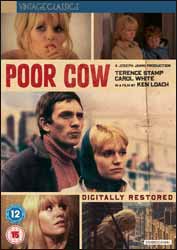|
Click here to return to the main site. DVD Review
Joy lives a typical working class life. Her husband, Tom, is a small time criminal. When he gets thrown into prison she takes up with a series of inappropriate men, ending up with her husband’s friend, Dave. Poor Cow (1967. 1 hr, 37 min, 22 sec) is a drama film directed by Ken Loach. It was his first movie, following a successful career in television, and the film was based on the novel by Nell Dunn. The movie is presented in a semi documentary style with narration from Joy. Like most of Loach’s work, the film did without a traditional script, making the actors improvise their dialogue. It is difficult to feel a great deal of sympathy for Joy (Carol White) as she voluntarily chooses to associate with criminals, first her husband Tom (John Bindon) and then when he ends up in prison, his mate Dave (Terence Stamp). Joy likes the nice things in life, but can only afford this lifestyle via the men she meets. After Tom gets send to prison, she briefly moves in with aging prostitute, aunty Emm. At this part of her life she takes up with Dave. Unlike Tom, who was both physically and emotionally abusive, Dave is rough, but a kinder man. Unfortunately, when Tom is released, Joy returns for the sake of their child, Johnny, only for Johnny to be temporarily lost - an event which coalesce Joy's understanding that she will do anything for the love of her son. This is a very gritty look at one section of working class life in the nineteen sixties, with music by Donovan. The one constant through the film is Carol White's, Joy. A woman who is powerless to change her life, the best job she can find is as a bar maid, or as a model for men to take seedy pictures. Most of her life is spent daydreaming about a better life, a better life she will never see. In the end she has a life consisting of pleasing men and raising babies like all the other "poor cows" around her. There are a number of extras on the DVD. Poor Cow and the British New Wave (10 min, 42) has John Hill and Melanie Williams talking about the film and its position in the new wave of social realistic film makers. Interview with Ken Loach (16 min) talking about his life and film making career. Interview with Terrance Stamp (7 min, 44 sec) discussing his contribution in the film and Interview with Nell Dunn (9 min, 33 sec), the author of the novel, who also wrote Up the Junction. Lastly there is a 1966 Archive Interview with Carol White (3 min, 16 sec). Although the film shows life existing in a slum, with few choices, this is not to say that the film lacks either wit or tenderness, but even when these do appear they are only glimpses into another life which is cruelly ripped away from Joy. The MPEG2 encoded picture is a little soft but fault free as is the Dolby Digital 2 audio track. 8 Charles Packer Buy this item online
|
|---|

